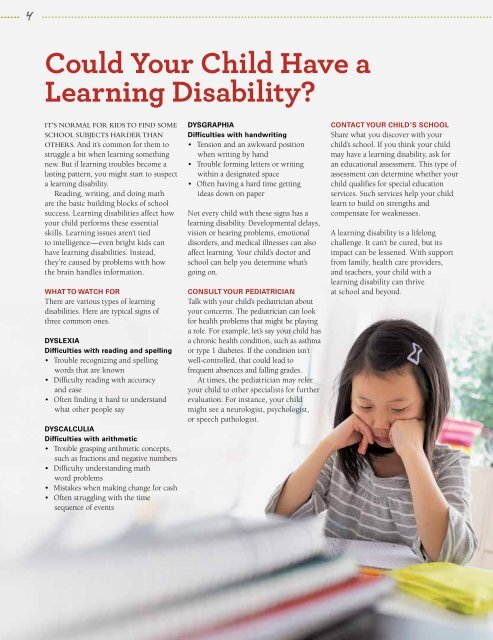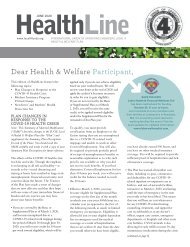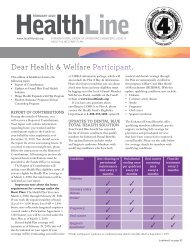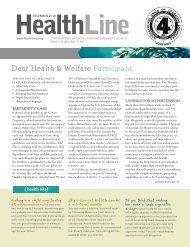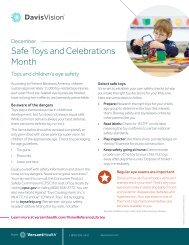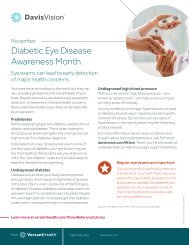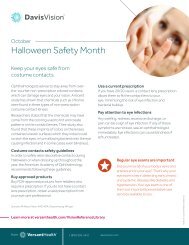April 2020
Create successful ePaper yourself
Turn your PDF publications into a flip-book with our unique Google optimized e-Paper software.
4<br />
Could Your Child Have a<br />
Learning Disability?<br />
IT’S NORMAL FOR KIDS TO FIND SOME<br />
SCHOOL SUBJECTS HARDER THAN<br />
OTHERS. And it’s common for them to<br />
struggle a bit when learning something<br />
new. But if learning troubles become a<br />
lasting pattern, you might start to suspect<br />
a learning disability.<br />
Reading, writing, and doing math<br />
are the basic building blocks of school<br />
success. Learning disabilities affect how<br />
your child performs these essential<br />
skills. Learning issues aren’t tied<br />
to intelligence—even bright kids can<br />
have learning disabilities. Instead,<br />
they’re caused by problems with how<br />
the brain handles information.<br />
WHAT TO WATCH FOR<br />
There are various types of learning<br />
disabilities. Here are typical signs of<br />
three common ones.<br />
DYSLEXIA<br />
Difficulties with reading and spelling<br />
• Trouble recognizing and spelling<br />
words that are known<br />
• Difficulty reading with accuracy<br />
and ease<br />
• Often finding it hard to understand<br />
what other people say<br />
DYSCALCULIA<br />
Difficulties with arithmetic<br />
• Trouble grasping arithmetic concepts,<br />
such as fractions and negative numbers<br />
• Difficulty understanding math<br />
word problems<br />
• Mistakes when making change for cash<br />
• Often struggling with the time<br />
sequence of events<br />
DYSGRAPHIA<br />
Difficulties with handwriting<br />
• Tension and an awkward position<br />
when writing by hand<br />
• Trouble forming letters or writing<br />
within a designated space<br />
• Often having a hard time getting<br />
ideas down on paper<br />
Not every child with these signs has a<br />
learning disability. Developmental delays,<br />
vision or hearing problems, emotional<br />
disorders, and medical illnesses can also<br />
affect learning. Your child’s doctor and<br />
school can help you determine what’s<br />
going on.<br />
CONSULT YOUR PEDIATRICIAN<br />
Talk with your child’s pediatrician about<br />
your concerns. The pediatrician can look<br />
for health problems that might be playing<br />
a role. For example, let’s say your child has<br />
a chronic health condition, such as asthma<br />
or type 1 diabetes. If the condition isn’t<br />
well-controlled, that could lead to<br />
frequent absences and falling grades.<br />
At times, the pediatrician may refer<br />
your child to other specialists for further<br />
evaluation. For instance, your child<br />
might see a neurologist, psychologist,<br />
or speech pathologist.<br />
CONTACT YOUR CHILD’S SCHOOL<br />
Share what you discover with your<br />
child’s school. If you think your child<br />
may have a learning disability, ask for<br />
an educational assessment. This type of<br />
assessment can determine whether your<br />
child qualifies for special education<br />
services. Such services help your child<br />
learn to build on strengths and<br />
compensate for weaknesses.<br />
A learning disability is a lifelong<br />
challenge. It can’t be cured, but its<br />
impact can be lessened. With support<br />
from family, health care providers,<br />
and teachers, your child with a<br />
learning disability can thrive<br />
at school and beyond.


